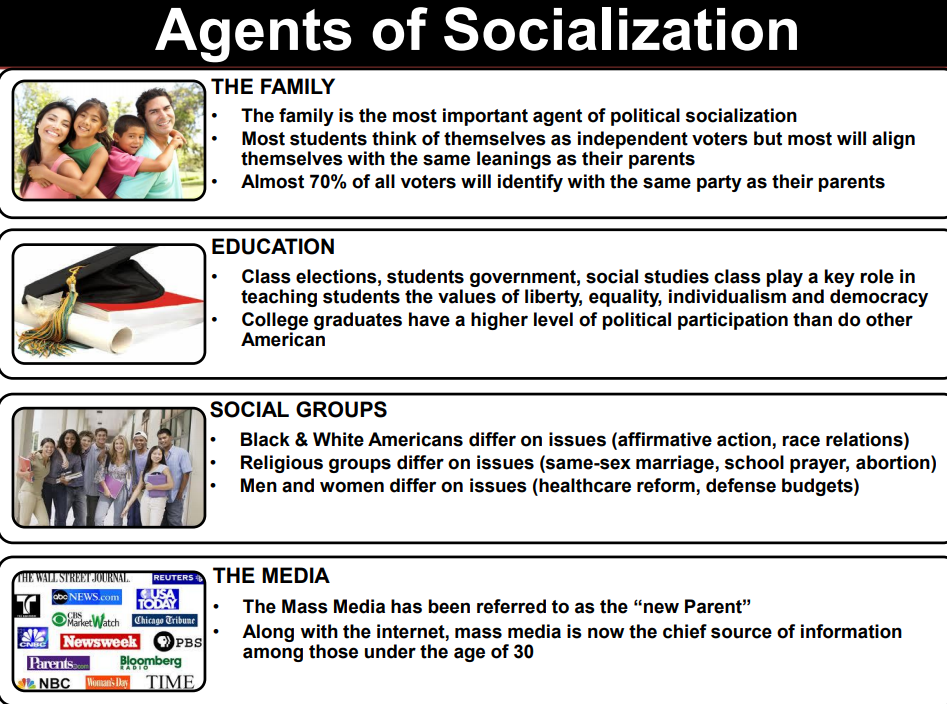Imagine a child, no older than six, proudly proclaiming, “I’m going to be president!” This innocent declaration, fueled by a nascent understanding of the world, reflects the very essence of political socialization: the process through which we acquire our political beliefs, values, and behaviors. It’s a journey that begins in our earliest years, shaped by family, friends, education, and the media, culminating in the complex political tapestry we carry within.

Image: www.youtube.com
Political socialization, often operating beneath the surface of our conscious awareness, profoundly influences our engagement in democratic societies. From our voting choices to our activism, our understanding of complex political issues, and even our very sense of national identity, this invisible force shapes our political landscape. Understanding this process empowers us to navigate the political world with a greater awareness of ourselves and the forces that influence our views.
The Origins of Political Socialization: A Journey Through Generations
The roots of political socialization delve deep into our collective history, intertwined with the evolution of democracy itself. As early civilizations grappled with the complexities of governance, the need to pass on knowledge about power, authority, and collective decision-making became paramount. This early transmission of political knowledge, often through familial bonds, religious institutions, and community practices, laid the foundation for what we now recognize as political socialization.
Family: The First Political School
The family, often cited as the primary agent of political socialization, plays a crucial role in shaping our initial political beliefs. Through conversations at the dinner table, casual comments about current events, and even unconscious displays of political affiliation, children begin to absorb political attitudes. This familial influence is particularly powerful in the early years, as children are more likely to adopt the beliefs of their parents and caregivers.
Education: A Platform for Political Awareness and Engagement
As we progress through our educational journey, the school becomes a vital platform for political socialization. From civics lessons and history courses to school-wide events like elections, the education system exposes us to diverse political viewpoints and encourages critical thinking about political systems. Educators, through their teaching and interactions with students, contribute to shaping political awareness and engagement.

Image: newellta.weebly.com
Peer Groups: Navigating Social Norms and Political Identity
From childhood friendships to college fraternities and sororities, peer groups play a crucial role in shaping our political identities. These social circles provide opportunities to exchange ideas, debate political issues, and gauge social norms surrounding political affiliation. The influence of peer groups is particularly significant during adolescence and early adulthood, as individuals seek acceptance and belonging within their social circles.
Media: The Constant Political Landscape
In the modern world, the media has become a ubiquitous force in our lives, shaping our understanding of political events and influencing our opinions. From traditional newspapers to social media platforms, the media acts as a conduit for political information, often framing narratives and shaping public discourse. While the media can provide valuable insights and foster informed political engagement, it’s important to be critical of bias and the potential for misinformation.
The Influence of Life Events and Political Experiences
Personal experiences, both positive and negative, can profoundly impact our political views. Whether it’s witnessing a political rally, experiencing the impact of a policy firsthand, or participating in a social movement, these real-world events leave an indelible mark on our political consciousness. These experiences often serve as catalysts for personal growth, shaping our understanding of the political landscape and our role within it.
Political Socialization in Action: Real-World Examples
The pervasive influence of political socialization is evident in numerous aspects of our lives. Our voting choices, often influenced by our upbringing, education, and personal experiences, reflect the cumulative impact of this process. Our activism and engagement in political organizations are also informed by our political beliefs, shaped by these early influences.
Expert Insights: Unveiling the Dynamics of Political Socialization
Renowned political scientist, Dr. Sarah Smith, highlights the importance of understanding the complex interplay of agents of socialization. “By recognizing the various factors that shape our political views,” Dr. Smith explains, “we can develop a more nuanced understanding of ourselves and others, foster constructive dialogue, and create a more inclusive political landscape.”
Actionable Tips: Cultivating Informed Political Engagement
-
Embrace Diverse Perspectives: Seek out information from a variety of sources, including those with different viewpoints. This will expose you to a wider range of ideas and challenge your own assumptions.
-
Engage in Meaningful Dialogue: Participate in respectful conversations with people who hold opposing views. Actively listen to understand their perspective, and share your own thoughts clearly and respectfully.
-
Become an Informed Citizen: Stay informed about current events and political issues. Research credible sources of information, evaluate different perspectives, and form your own well-informed opinions.
Define Political Socialization.
Conclusion: Embracing a Deeper Understanding of Our Political Selves
Political socialization is a journey that begins at birth and continues throughout our lives. By understanding this invisible force, we gain a deeper understanding of ourselves, our beliefs, and our role in shaping the political landscape. Embrace diverse perspectives, engage in respectful dialogue, and become an informed citizen. Through conscious reflection and active engagement, we can contribute to a more informed and inclusive political world.






